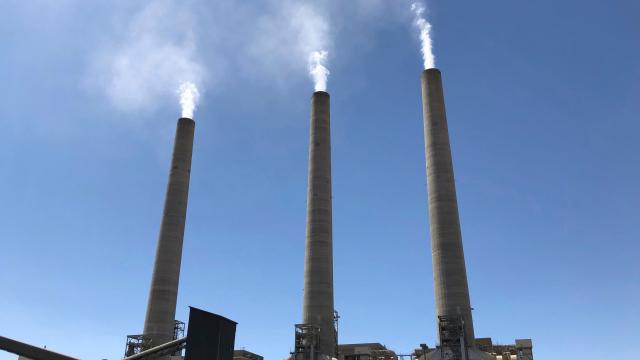Before the coronavirus pandemic threw the U.S. into recession, the Navajo Nation was already dealing with a recession of its own. With the closure of a giant coal plant last year, the tribal nation had lost more than $US40 ($58) million in revenue. Now, the pandemic is exacerbating an already-tough situation for the Navajo Nation, which has been among the hardest-hit by the coronavirus.
The economic woes brought on by this highly contagious coronavirus have created even further urgency for the federal government to begin planning a proper economic transition for communities that are dependent on the coal industry. That’s why the Just Transition Fund, a group working to create equitable solutions for workers in the transition away from coal, released a platform Monday detailing key steps the federal government needs to take to address the needs of its constituents. Coal has been dying for years, but the pandemic is further hastening the shuttering of the plants. They’re just too expensive to operate, and just about everyone is short on cash these days.
To deal with the rapidly changing energy landscape, the National Economic Transition Platform calls on the government to create a National Community Transition Action Plan and a new federal Office of Economic Transition with an advisory board that reflects the diversity of stakeholders, especially those who are Indigenous. That representation is vital to building trust between the federal government and tribes.
“What we need is Indigenous-led and local communities that have developed tangible solutions to solve economic problems,” Heidi Binko, the executive director of the Just Transition Fund, told Earther. “It’s going to be incredibly important for Indigenous organisations and other local community leaders to be at the table and telling federal policymakers what they need and making sure that those policies are created in the right way.”
While the plan calls for federal action and money, the platform is clear that the government must invest in local leadership, especially organisations led by people of colour, so that they can make their own decisions on how to use funds. However, there are a few basics that the platform argues everyone needs but does not have access to, such as access to internet, power, and healthcare. As communities move away from coal, communities need to see economic development in these basic infrastructure needs.
Indigenous communities disproportionately lack access to these resources. Native Americans are less likely to be connected to the internet compared to non-Native people, according to U.S. Census Bureau data. On the Navajo Nation, 15,000 homes don’t have electricity. They make up 75% of all unelectrified households in the U.S., according to the American Public Power Association. With the coronavirus forcing people to stay home, access to electricity and the internet are especially important. The report is explicit in calling for the federal government needs to invest in this critical infrastructure. Not only will this help spur economic development in the absence of coal, but it will also provide what are increasing viewed as human rights.
“[Native Americans] sell art. They’re welders. They’re carpenters. They have all kinds of skillsets. Some of them are mechanics. Some of them are weavers. There’s medicine men, herbalists, but a lot of them want to be able to sell that, and that’s really the new reality: doing online commerce,” Tony Skrelunas, the former economic director for the Navajo Nation who partnered on this platform publication, told Earther. “But if you don’t have the broadband, if you don’t have the internet capacity, it’s very limited in how you do all this stuff.”
Skrelunas has seen firsthand the way the closure of the Navajo Generating Station in Arizona and, then, the coronavirus pandemic has decimated the the already tenuous financial stability of his people. Shopping malls are closed as are the casinos, restaurants, and hotels. That’s why they need new economic opportunities. The situation was bad before, but it can get much worse if there’s no federal intervention.
The federal government created many of the adverse socioeconomic conditions tribal nations face through colonialism and government-led deals that cheated indigenous communities of their natural resources.
“The roads, the water lines, the lack of water infrastructure, the lack of electric infrastructure, all that has to do with the ways that the federal government prioritised state-building within the region,” Andrew Curley, an assistant professor who studies Indigenous geography and resources at the University of North Carolina, told Earther. “Those are the problems that are long-standing that are part of a kind of federal investment in Indian Country that was, in the long term, disadvantageous toward tribes.”
Curley said he’s wary of any transition plan that requires federal involvement given the history of how the federal government has partnered with tribal governments in unjust ways. Still, he recognised that Indigenous leadership in the planning of this transition could make a difference and is an improvement in how these processes have historically worked.
Right now, this is only a plan, but the platform’s proponents hope national leaders heed their call. Coal is dying, and there’s no better time to finally develop a plan to help the people who will be most affected by its demise.
